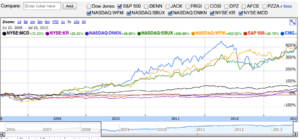A few weeks ago one of our thoughtful engineers sent me a note wondering aloud about the correlation of sustainability-minded companies to above average stock price performance. Like others with an environmental bias he hoped to feel good about buying shares in publicly traded, relatively greener companies while still making a strong financial return (and further driving down the cost of capital for these same companies.)
On a whim he had picked a few companies he viewed as “green” (Whole Foods, Chipotle and Starbucks) and plotted them against more traditional companies in their sectors (Kroger, McDonalds and Dunkin Donuts) along with the S&P 500 as a benchmark. Sure enough the green ones performed better over time.

“How would you explain their far superior performance if you can’t chalk it up to the CEO’s sustainable beliefs and operating principles?” he wondered.
If only it were that easy.
What he also knows is that everyday we politely provoke our F500 customers into investing more money in under three-year payback energy efficiency projects. We’ve field demonstrated the applications, metered and verified that the energy and cost savings will materialize. And we’ve already secured a rebate incentive from the company’s local utility. The risk is low and the opportunities are always there.
But while we hope F500 companies invest because “it’s the right thing to do,” we know even these fast-payback investments must first get the attention of senior management and then make it past the brutal annual budgeting cycle, going against all other discretionary investments. This is true for larger (over $1 million) and smaller (under $50k) investments alike.
One recent more positive trend we’ve observed is the “this works – let’s do a lot more of it” phenomenon. In these cases we’ve already performed a project for company’s management, they’ve seen the energy savings and know that many more of the IDENTICAL projects exist within their portfolio. They engage us for an efficiency rollout program with much bigger dollar savings that can be forecasted for their operating budget. Their investment is 10x the size of their original project – as is the savings. Still, for my purposes, we don’t see this often enough 🙂
Ironically, while on the plane headed to Greentech Media’s Avant EE conference in San Francisco, I read about a recent research project by Thomas Lys, one of my former accounting professors at Kellogg School of Management, on the stock price question.
Professors Lys, James Naughton and Clare Wang had collected data for hundreds of companies, across multiple industries, for the period from 2002 through 2010. Knowing that over 50% of the F500 now issue corporate accountability reports, the team wondered whether the corporate sustainability investments led to improved financial performance.
The team concluded that companies making significant CSR investments did not deliver better financial performance. They confirmed what I had debated with our engineer – from the investors perspective CSR investments do not make a sufficient impact to the bottom line.
However, investors sometimes did respond favorably to these companies as a result of their CSR investments.
Why?
Equity analysts took the investments as a signal of management’s confidence that future earnings would be strong. (Presumably thinking why else would they be investing in non-core areas?)
It’s counterintuitive – and makes me wonder whether Groom Energy needs to change how we coach our customers.

